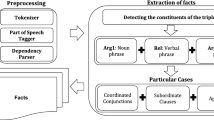Abstract
This paper presents a comparative evaluation of several Portuguese parsers. Our objective is to use dependency parsers in a specific information extraction task, namely Open Information Extraction (OIE), and measure the impact of each parser in this task. The experiments show that the scores obtained by the evaluated parsers are quite similar even though they allow to extract different (and then complementary) itens of information.
Access this chapter
Tax calculation will be finalised at checkout
Purchases are for personal use only
Similar content being viewed by others
Notes
- 1.
In this analysis, we use labels and syntactic criteria based on Universal Dependencies, e.g. prepositions are case-marking elements that are dependents of the noun or clause they attach to or introduce.
- 2.
- 3.
- 4.
Labeled extractions along with the gold standard are available at https://gramatica.usc.es/~gamallo/datasets/OIE_Dataset-pt.tgz.
References
Afonso, S., Bick, E., Haber, R., Santos, D.: Floresta sintá(c)tica: a treebank for Portuguese. In: The Third International Conference on Language Resources and Evaluation, LREC 2002, pp. 1698–1703, Las Palmas de Gran Canaria, Spain (2002)
Banko, M., Cafarella, M.J., Soderland, S., Broadhead, M., Etzioni, O.: Open information extraction from the web. In: International Joint Conference on Artificial Intelligence, pp. 2670–2676 (2007)
Collovini, S., Machado, G., Vieira, R.: Extracting and structuring open relations from Portuguese text. In: Silva, J., Ribeiro, R., Quaresma, P., Adami, A., Branco, A. (eds.) PROPOR 2016. LNCS (LNAI), vol. 9727, pp. 153–164. Springer, Cham (2016). https://doi.org/10.1007/978-3-319-41552-9_16
Del Corro, L., Gemulla, R.: ClausIE: clause-based open information extraction. In: Proceedings of the World Wide Web Conference (WWW-2013), pp. 355–366, Rio de Janeiro, Brazil (2013)
Etzioni, O., Fader, A., Christensen, J., Soderland, S., Mausam, M.: Open information extraction: the second generation. In: International Joint Conference on Artificial Intelligence, pp. 3–10. AAAI Press (2011)
Fader, A., Soderland, S., Etzioni, O.: Identifying relations for open information extraction. In: Conference on Empirical Methods in Natural Language Processing, pp. 1535–1545. ACL (2011)
Gamallo, P.: Dependency parsing with compression rules. In: Proceedings of the 14th International Workshop on Parsing Technology (IWPT 2015), Bilbao, Spain, pp. 107–117. Association for Computational Linguistics (2015)
Gamallo, P., Garcia, M.: Multilingual open information extraction. In: Pereira, F., Machado, P., Costa, E., Cardoso, A. (eds.) EPIA 2015. LNCS (LNAI), vol. 9273, pp. 711–722. Springer, Cham (2015). https://doi.org/10.1007/978-3-319-23485-4_72
Gamallo, P., Garcia, M.: Dependency parsing with finite state transducers and compression rules. Inf. Process. Manag. (2018). Accessed 5 June 2018
Gamallo, P., Garcia, M., Fernández-Lanza, S.: Dependency-based open information extraction. In: ROBUS-UNSUP 2012: Joint Workshop on Unsupervised and Semi-Supervised Learning in NLP at the 13th Conference of the European Chapter of the Association for Computational Linguistics (EACL 2012), Avignon, France, pp. 10–18 (2012)
Gómez-Rodríguez, C., Alonso-Alonso, I., Vilares, D.: How important is syntactic parsing accuracy? An empirical evaluation on sentiment analysis. Artif. Intell. Rev. 1–17 (2017, forthcoming). https://doi.org/10.1007/s10462-017-9584-0
Gómez-Rodríguez, C., Nivre, J.: A transition-based parser for 2-planar dependency structures. In: Proceedings of the 48th Annual Meeting of the Association for Computational Linguistics, ACL 2010, Stroudsburg, PA, USA, pp. 1492–1501 (2010)
Claro, D.B., de Oliveira, L.S., Glauber, R.: Dependentie: an open information extraction system on Portuguese by a dependence analysis. In: Proceedings of XIV Encontro Nacional de Inteligência Artificial e Computacional, pp. 271–282 (2017)
Mausam, M., Schmitz, M., Soderland, S., Bart, R., Etzioni, O.: Open language learning for information extraction. In: Conference on Empirical Methods in Natural Language Processing and Computational Natural Language Learning, pp. 523–534 (2012)
Nivre, J., et al.: Maltparser: a language-independent system for data-driven dependency parsing. Nat. Lang. Eng. 13(2), 115–135 (2007)
Rademaker, A., Chalub, F., Real, L., Freitas, C., Bick, E., de Paiva, V.: Universal dependencies for Portuguese. In: Proceedings of the Fourth International Conference on Dependency Linguistics (Depling), pp. 197–206, Pisa, Italy, September 2017
Santos, V., Pinheiro, V.: Report: um sistema de extração de informações aberta para a língua Portuguesa. In: Proceedings of the X Brazilian Symposium in Information and Human Language Technology (STIL), Natal, RN, Brazil, pp. 191–200 (2015)
Zavaglia, C.: O papel do léxico na elaboração de ontologias computacionais: do seu resgate à sua disponibilização. In: Martins, E.S., Cano, W.M., Filho, W.B.M. (eds.) Lingüística IN FOCUS - Léxico e morfofonologia: perspectivas e análises, pages 233–274. EDUFU, Uberlândia (2006)
Acknowledgments
Pablo Gamallo has received financial support from a 2016 BBVA Foundation Grant for Researchers and Cultural Creators, TelePares (MINECO, ref:FFI2014-51978-C2-1-R), the Consellería de Cultura, Educación e Ordenación Universitaria (accreditation 2016–2019, ED431G/08) and the European Regional Development Fund (ERDF). Marcos Garcia has been funded by the Spanish Ministry of Economy, Industry and Competitiveness through the project with reference FFI2016-78299-P, by a Juan de la Cierva grant (IJCI-2016-29598), and by a 2017 Leonardo Grant for Researchers and Cultural Creators, BBVA Foundation.
Author information
Authors and Affiliations
Corresponding author
Editor information
Editors and Affiliations
Rights and permissions
Copyright information
© 2018 Springer Nature Switzerland AG
About this paper
Cite this paper
Gamallo, P., Garcia, M. (2018). Task-Oriented Evaluation of Dependency Parsing with Open Information Extraction. In: Villavicencio, A., et al. Computational Processing of the Portuguese Language. PROPOR 2018. Lecture Notes in Computer Science(), vol 11122. Springer, Cham. https://doi.org/10.1007/978-3-319-99722-3_8
Download citation
DOI: https://doi.org/10.1007/978-3-319-99722-3_8
Published:
Publisher Name: Springer, Cham
Print ISBN: 978-3-319-99721-6
Online ISBN: 978-3-319-99722-3
eBook Packages: Computer ScienceComputer Science (R0)




